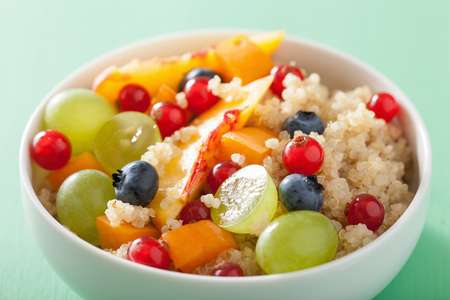Your Pregnancy Diet

In this article, you will find:
Vegetarian and low GI diets, and your calorie intake
A vegetarian diet, and vegan diets where dairy products are excluded, can be safe and healthy during pregnancy as long as you ensure a good balance of nutrients and sufficient protein (see Vegetarian mom-to-be). Babies born to vegetarians are in a healthy weight range, although vegans do need to be vigilant about obtaining adequate protein, as well as reliable sources of B12 and zinc. Vegans can discuss with their doctors whether they'll be able to meet their vitamin B12 needs through diet alone. Since vitamin B12 is found primarily in animal sources, a supplement may be required. Non-animal sources of B12 may be unreliable.
Glucose, the product of carbohydrates, serves as the primary fuel for your growing baby. A new concept in nutrition is the glycemic index (GI), which looks at how much a food will raise the level of glucose in the bloodstream. Foods that release glucose gradually, such as unrefined carbohydrates, and thus have a low GI, appear to be healthier.
Evidence suggests that a low GI diet has health benefits for both the mother and baby. Maternal carbohydrate intake can affect glucose levels in the bloodstream, which in turn can affect the baby's growth. Higher glucose levels, even those in the normal range, can make for a bigger baby-above the 90th percentile (the top end of a baby's growth chart. There are health risks later in life linked to a high birth weight, such as obesity, diabetes, and heart disease. One study found that women who consumed a low GI diet had infants that were a normal size, but had less body fat than those from women who consumed a high GI diet.
A low GI diet can also help control glucose levels in mothers with gestational diabetes, in turn reducing complications of labor and birth associated with this condition.
During pregnancy, most women need to increase their calorie intake by 100-300 calories a day for proper nutrition and weight gain. Your energy needs may vary depending on your pre-pregnancy weight and your activity levels.
Gaining the correct amount of weight in pregnancy has benefits for both mother and baby. You're more likely to return to your pre-pregnancy weight if you gain weight within the recommended guidelines (see How much weight will you gain?). Gaining too much weight is linked with bigger babies, which carries future risks to the baby's health. Conversely, gaining too little weight is also not ideal for a baby's future health.